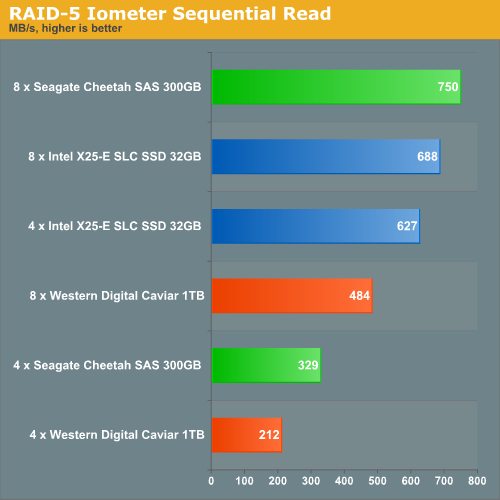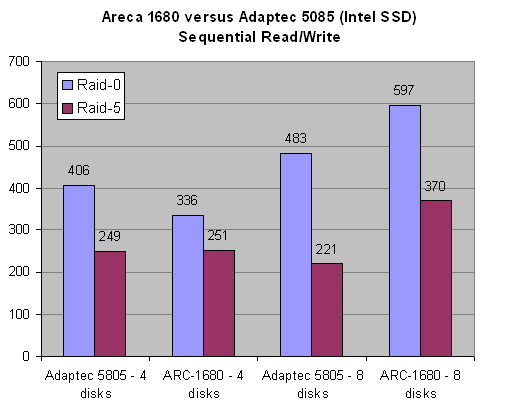SSD versus Enterprise SAS and SATA disks
by Johan De Gelas on March 20, 2009 2:00 AM EST- Posted in
- IT Computing
RAID 5 in Action
RAID 0 is good way to see how adding more disks scales up your writing and reading performance. However, it is rarely if ever used for any serious application. What happens if we use RAID 5?

We see a picture very similar to what we saw with our RAID 0 numbers. The SAS protocol is more efficient than the SATA interface. Four SLC SSDs already come close to the highest bandwidth that our Adaptec HBA is capable of extracting out of SATA disks. Add four more and you bump into a 700 MB/s bottleneck. At first, our eight drive results look weird, as they are more than twice as fast as the four drives results. In the case of four drives, our controller will write three striped blocks of data and one parity block on our RAID array. With eight drives, we are striping seven blocks and we only have to write one parity block. So we can expect a maximum scaling of 2.3 (7/3), which explains the "the better than doubling" in performance.

Once we interleave some writing with reading, something remarkable happens: eight SLC SSDS are (slightly) slower than four are. We have no real explanation for this, other than that this might have something to do with the choices Adaptec made when writing the firmware. We tried out the Areca 1680 controller, which uses the same controller (Intel Dual-core IOP348 1.2GHz) but with different firmware.

The Areca 1680 controller is almost 20% slower with four SLC SSD drives in RAID 0, but scales well from four to eight drives (+78%). In comparison, the Adaptec controller is only 19% faster with an additional four drives. In RAID 5 the difference is even more dramatic. Adding four extra drives (for a total of eight) leads to a performance decrease on the Adaptec card, while there is a decent 47% scale up in performance in the same situation on the Areca 1680. Thus, we conclude that is likely that the Adaptec firmware is to blame. We used both the 1.44 (August 2008) and 1.46 (February 2009) firmware, and although the latest firmware gave a small boost, we made the same observations.










67 Comments
View All Comments
shady28 - Sunday, November 15, 2009 - link
I would have really like to see single drive performance of SAS 15K drives vs SSDs. The cost of a SAS controller ($60) + a 15K 150Gig drive ($110-$160) is less than any of the high end SSDs, and about the same as a low end SSD. It's a viable option to get a 15K Drive, but very difficult to see what is the best choice when looking at RAID configs and database IOPs.
newriter27 - Tuesday, May 5, 2009 - link
What was the Queue Depth setting used with IOmeter? Was it maintained consistently?Also, how come no response times?
mikeblas - Friday, April 17, 2009 - link
Intel has posted a firmware upgrade for their SSD drives which tries to address the write leveling problem. The patch improves matters, somewhat, but the overall performance level from the drives is still completely unacceptable for production applications.You can find it here: http://www.intel.com/support/ssdc/index_update.htm">http://www.intel.com/support/ssdc/index_update.htm
Lifted - Sunday, April 12, 2009 - link
I like it!turrican2097 - Monday, March 30, 2009 - link
Please mention or correct this on your article.1) You should mention that the price per GB is 65x higher than the 1TB drives, since you chose to include them.
2) Your WD is a poor performance 5400RPM Green Power drive: http://www.techreport.com/articles.x/16393/8">http://www.techreport.com/articles.x/16393/8
3) If you make such a strong point on how much faster SSDs are than platters, you can't pick the best SSD and then use the hardrives you happen to have laying around the lab. Pick Velociraptors or WD RE3 7200RPM and then Seagate 15K7.
Thank you
mutantmagnet - Monday, April 6, 2009 - link
It's irrelevant. Raptors don't outperform SAS which are better in terms of performance for the GB paid for. There's no need to belittle them when they are clearly aware of the type of point you are making and went beyond it.So far I've found these recent SSD articles to be a fun and worthwhile read; and the comments have been invaluable, even if some people sound a little too aggressive in making their points.
virtualgeek - Friday, March 27, 2009 - link
Just wanted to point this out - we are now shipping these 200GB and 400GB SLC-based STEC drives in EMC Symmetrix, CLARiiON and Celerra. These are the 2nd full generation of EFDs.Gang - this IS the future of performance-oriented storage (not implying it will be EMC-unique - it won't be - everyone will do it - from the high end to the low end) - only a matter of time (we're currently at the point where they are 1/3 the acquisition cost to hit a given IOPS workload - and they have dropped by a factor of 4x in ONE YEAR).
With Intel and Samsung entering to the market full force - the price/performance/capacity curve will continue to accelerate.
ms0815 - Friday, March 27, 2009 - link
Since modern Graphic cards crack passwords more than 10 times faster than a CPU, wouldn't they also be greate Raid Controllers with their massive paralel design?Casper42 - Thursday, March 26, 2009 - link
I would have liked to have seen 2 additional drives tossed into the mix on this one.1) The Intel X25-M - Because I think it would serve as a good middleground between the SAS Drives and the E model. Cheaper/GB but still gets you a much faster Random Read result and I'm sure a slightly faster Random Write as well.
2) 2.5" SAS Drives - Because mainstream servers like HP and Dell seem to be going more and more this direction. I don't know many Fortune 500s using Supermicro. 2.5" SAS goes up to 72GB for 15K and 300GB for 10K currently. Though I am hearing that 144GB 15K models are right around the corner.
Thanks for an interesting article!
MrSAballmer - Thursday, March 26, 2009 - link
SDS with ATA!http://www.youtube.com/watch?v=x4dxTRkODbE">http://www.youtube.com/watch?v=x4dxTRkODbE
http://fakesteveballmer.blogspot.com">http://fakesteveballmer.blogspot.com